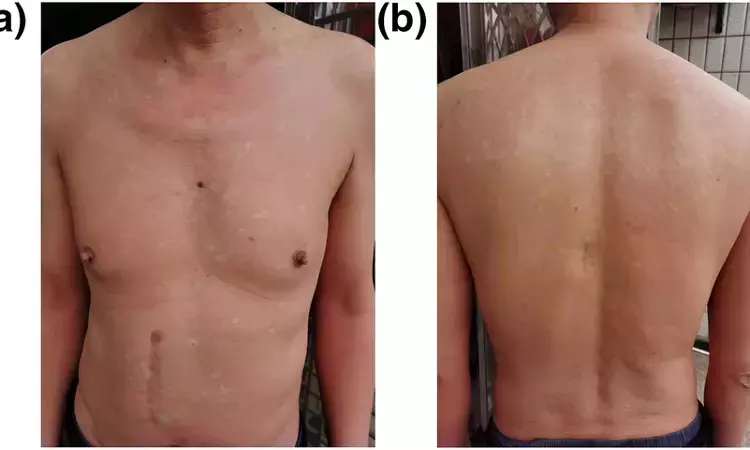- Home
- Medical news & Guidelines
- Anesthesiology
- Cardiology and CTVS
- Critical Care
- Dentistry
- Dermatology
- Diabetes and Endocrinology
- ENT
- Gastroenterology
- Medicine
- Nephrology
- Neurology
- Obstretics-Gynaecology
- Oncology
- Ophthalmology
- Orthopaedics
- Pediatrics-Neonatology
- Psychiatry
- Pulmonology
- Radiology
- Surgery
- Urology
- Laboratory Medicine
- Diet
- Nursing
- Paramedical
- Physiotherapy
- Health news
- Fact Check
- Bone Health Fact Check
- Brain Health Fact Check
- Cancer Related Fact Check
- Child Care Fact Check
- Dental and oral health fact check
- Diabetes and metabolic health fact check
- Diet and Nutrition Fact Check
- Eye and ENT Care Fact Check
- Fitness fact check
- Gut health fact check
- Heart health fact check
- Kidney health fact check
- Medical education fact check
- Men's health fact check
- Respiratory fact check
- Skin and hair care fact check
- Vaccine and Immunization fact check
- Women's health fact check
- AYUSH
- State News
- Andaman and Nicobar Islands
- Andhra Pradesh
- Arunachal Pradesh
- Assam
- Bihar
- Chandigarh
- Chattisgarh
- Dadra and Nagar Haveli
- Daman and Diu
- Delhi
- Goa
- Gujarat
- Haryana
- Himachal Pradesh
- Jammu & Kashmir
- Jharkhand
- Karnataka
- Kerala
- Ladakh
- Lakshadweep
- Madhya Pradesh
- Maharashtra
- Manipur
- Meghalaya
- Mizoram
- Nagaland
- Odisha
- Puducherry
- Punjab
- Rajasthan
- Sikkim
- Tamil Nadu
- Telangana
- Tripura
- Uttar Pradesh
- Uttrakhand
- West Bengal
- Medical Education
- Industry
Biologics useful treatment option for patients with pityriasis rubra pilaris, finds research

Biologics are a treatment option for patients with pityriasis rubra pilaris suggests a new study published in the Cutaneous Medicine and Surgery.
A study was done to describe the published efficacy and adverse event rates associated with existing biologics for the treatment of pityriasis rubra pilaris (PRP). A literature review using the PubMed database (January 1990-July 2023) was conducted. Multiple search combinations were conducted using “pityriasis rubra pilaris” and various biologics as keywords to identify relevant articles. Inclusion criteria included all study types that were published within the past 30 years in English and mentioned at least one biologic and PRP. A preliminary search yielded a total of 499 results. After screening using inclusion and exclusion criteria, 77 relevant articles (69 case reports, 5 case series, 2 clinical trials, and 1 retrospective analysis) were analyzed. TNF-α inhibitors have been evaluated and are effective in treating PRP.
However, recent treatment with anti-interleukin (IL)-17 and anti-IL-23 therapies such as ustekinumab, secukinumab, and ixekizumab are emerging as new treatment options with a mean improvement in PRP Area and Severity Index scores, change in severity of erythema, scaling, and thickness of PRP lesions. From initial clinical trials, secukinumab and ixekizumab are promising treatment options for achieving remission. This review compares the efficacy for numerous biologics and a discussion to guide clinicians on benefits and risks in choosing a biologic for PRP patients. Biologics may be a favourable treatment option leading to greater patient adherence due to reduced dosing frequencies, improvement in quality of life, and reduction in frequency and severity of flares.
Reference:
Chandy RJ, Chokshi A, Tan I, Feldman SR. Biologics for Treatment of Pityriasis Rubra Pilaris: A Literature Review. Journal of Cutaneous Medicine and Surgery. 2024;0(0). doi:10.1177/12034754241238735
Dr. Shravani Dali has completed her BDS from Pravara institute of medical sciences, loni. Following which she extensively worked in the healthcare sector for 2+ years. She has been actively involved in writing blogs in field of health and wellness. Currently she is pursuing her Masters of public health-health administration from Tata institute of social sciences. She can be contacted at editorial@medicaldialogues.in.
Dr Kamal Kant Kohli-MBBS, DTCD- a chest specialist with more than 30 years of practice and a flair for writing clinical articles, Dr Kamal Kant Kohli joined Medical Dialogues as a Chief Editor of Medical News. Besides writing articles, as an editor, he proofreads and verifies all the medical content published on Medical Dialogues including those coming from journals, studies,medical conferences,guidelines etc. Email: drkohli@medicaldialogues.in. Contact no. 011-43720751


